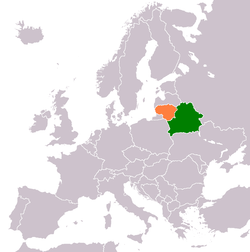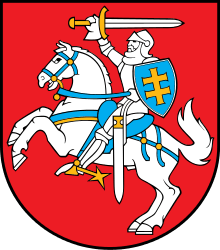Belarus–Lithuania relations
 | |
Belarus |
Lithuania |
|---|---|
Belarusian-Lithuanian relations are foreign relations between Belarus and Lithuania. Until 1991, both countries were part of the Soviet Union and before 1918 part of the Russian Empire and Grand Duchy of Lithuania. The countries established diplomatic relations on October 24, 1991, shortly after the dissolution of the Soviet Union. Belarus has an embassy in Vilnius. Lithuania has an embassy in Minsk and a general consulate in Hrodna. The two countries share 680 km of common border.
Each country hosts opposition figures for the other, with Belarus sheltering coup-leader Vladimir Uschopchik and Lithuania harboring Belarusian opposition figures. Lithuania has attempted to encourage a European orientation in Belarusian leadership, and has pursued trade deals and cooperation among law enforcement agencies. Sharing of information led to the arrest of Belarusian human-rights activist Ales Bialatski, resulting in European condemnation of both countries.[1]
Belarusian President Alexander Lukashenko made two official visits to Lithuania in 1995 and September 2009.
Country comparison
| Coat of Arms | .svg.png) |
 |
| Flag |  |
 |
| Population | 9,498,700[2] | 2,810,865[3] |
| Area | 207,595 sq km (80,155 sq mi) | 65,300 sq km (25,212 sq mi) |
| Population density | 45.8/km² (120.8/sq mi) | 43/km² (111/sq mi) |
| Capital | Minsk | Vilnius |
| Largest city | Minsk – 1,921,807 (2,101,018 metro) | Vilnius – 545,280 (805,173 metro) [4] |
| Government | Unitary presidential republic | Unitary semi-presidential republic |
| Current leaders | Alexander Lukashenko (president), Sergei Rumas (prime minister) | Dalia Grybauskaitė (president), Saulius Skvernelis (prime minister) |
| Official languages | Belarusian (official state language), Russian (co-official) | Lithuanian |
| Main religions | 55.4% Christianity (48.3% Eastern Orthodoxy, 7.1% Catholic), 31.1% non-religious, 3.5% other | 81.38% Christianity (77.2% Catholic, 4.9% Orthodox), 10.1% undeclared, 6.1% non-religious, 1.67% other |
| Ethnic groups | 83.7% Belarusians, 8.3% Russians, 3.1% Poles, 1.7% Ukrainians, 3.2% other | 86.7% Lithuanians, 5.6% Poles, 4.8% Russians, 1.3% Belarusians, 0.7% Ukrainians, 0.9% other[5] |
| GDP (nominal) | $53 billion ($5,745 per capita)[6] | $51.372 billion ($18,312 per capita) |
| GDP (PPP) | $176 billion ($19,198 per capita) | $95.591 billion ($34,074 per capita) [7] |
See also
External links
- Belarusian embassy in Vilnius
- Lithuanian Ministry of Foreign affairs: list of bilateral treaties with Poland (in Lithuanian only)
- Lithuanian embassy in Minsk (in Lithuanian and Russian only)
- Lithuanian general consulate in Hrodna (in Lithuanian and Russian only)
- Diena.lt -- Prezidentė Dalia Grybauskaitė Minske 2010-10-20
References
- ↑ Eastern approaches (8 August 2011). "The snitches of Vilnius". The Economist. Retrieved 13 September 2013.
- ↑ "Demographic situation in 2015". Belarus Statistical Office. 27 January 2016. Archived from the original on 3 February 2016. Retrieved 27 January 2016.
- ↑ "Statistikos departamentas".
- ↑ osp.stat.gov.lt
- ↑ "Lietuvos gyventojų tautinė sudėtis 2014–2015 m". Alkas.lt. Retrieved 6 October 2017.
- ↑ "Belarus". International Monetary Fund. 2017. Retrieved 26 October 2017.
- ↑ "Lithuania". International Monetary Fund. 2017. Retrieved 27 October 2017.